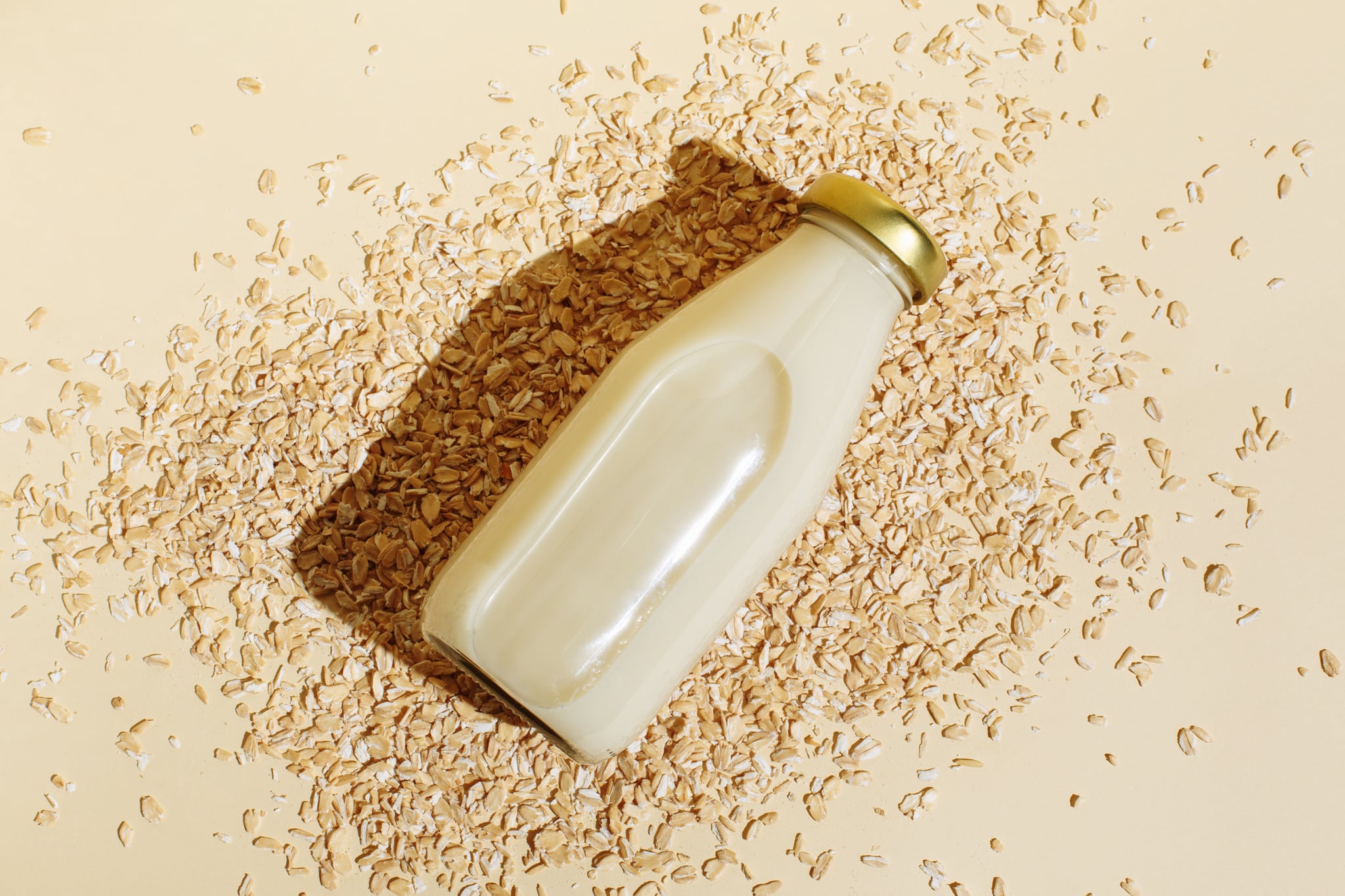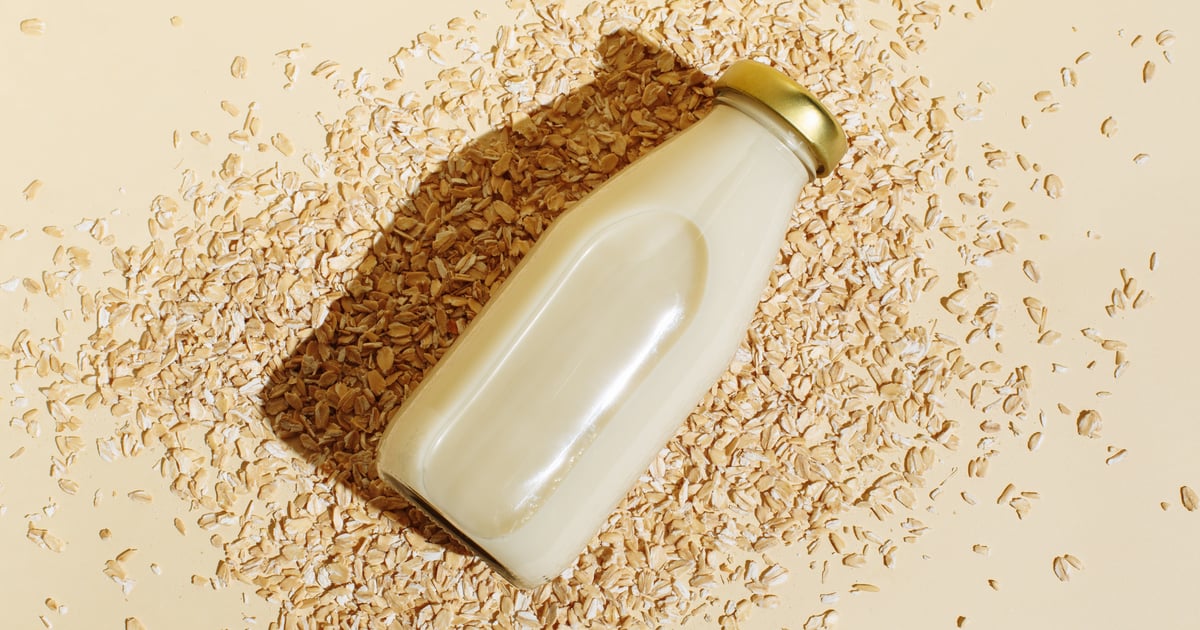Products You May Like

If you’re avoiding cow’s milk because it bugs your stomach, you’re vegan, or it just weirds you out, there’s no shortage of plant-based milks to choose from. Almond milk is the most-sold type of plant-based milk in the US, per Statista, followed by oat milk, a relative newcomer to the alt-milk industry.
Oat milk is made simply by blending oats and water. It originated in Sweden in 1994, but didn’t make it mainstream in the US until about 2018, when its popularity skyrocketed, per CNBC. And since then, it’s been the It girl in the alt-milk industry, thanks to its slightly sweet taste and ability to make any coffee drink taste amazing.
Is oat milk healthy, though? And how does oat milk’s nutrition compare to other alt milks, as well as traditional dairy? We asked dietitians to weigh in.
Oat Milk Nutrition Facts
The exact nutrition facts of oat milk will depend on which brand and type you buy. There are unsweetened and sweetened varieties, as well as flavored, organic, and barista versions of oat milk. Oat milk is made using oats and water, so the simplest version of the drink should contain just those ingredients, and maybe some salt for taste.
According to the United States Department of Agriculture (USDA), 8 ounces of unsweetened, unenriched oat milk (with added salt) contains about:
| Oat Milk Nutrition Facts | per 8-oz cup |
|---|---|
| Calories | 79 |
| Protein | 4 g |
| Fat | 1.5 g |
| Carbohydrate | 14 g |
| Fiber | 2 g |
| Sugar | 1 g |
Oat milk also provides a small amount of iron, potassium, and calcium, all equating to less than 10 percent of your daily value of each nutrient, per the USDA. Some oat milks are enriched, so you can get a bigger boost of nutrients if you’d like. For example, Oatly’s Oat Drink is fortified with vitamin D, riboflavin, vitamin B12, calcium, and iodine.
Oat Milk vs. Almond Milk, Soy Milk, and Dairy
Compared to almond milk, oat milk has fewer calories, and less protein and fat, but more fiber, per the USDA. (Unsweetened almond milk contains 130 calories, 5 g protein, 11 g fat, and 0 g fiber per 8-ounce cup.)
Compared to soy milk, oat milk has about the same amount of calories and fiber, but more fat and protein. (Unsweetened Silk Soy Milk, for example, contains 80 calories, 2 g fiber, 4.5 g fat, and 7 g protein per 8-ounce cup.)
And compared to 2 percent fat dairy milk, oat milk has significantly fewer calories, protein, sugar, and calcium, but the same amount of fat, per the USDA. (Reduced fat 2 percent cow’s milk contains 122 calories, 8 g protein, 12 g sugar, 309 mg calcium, and 4 g fat.)
Benefits of Oat Milk
Oatmeal is quite healthy, so considering the fact that oat milk is made from the same main ingredients, it stands that oat milk should be pretty healthy, too. From improved digestion to hydration, here’s what you can expect from drinking oat milk.
Improved digestion and heart health.
Though an 8-ounce cup of oat milk only provides about 2 grams of fiber (about 7 percent of your daily fiber recommendation), it is higher in fiber than other plant-based milks, says Stephanie Ferrari, MS, RDN, of FRESH Communications. That’s great news because fiber “is good for digestion and heart health,” Ferrari says.
Specifically, oat milk contains soluble fiber, which absorbs water in the gut, forming a gel-like substance that slows down digestion. Soluble fiber helps “reduce the absorption of cholesterol in your bloodstream,” registered dietitian Willow Jarosh, RD, of C&J Nutrition, tells POPSUGAR, which plays a part in decreasing LDL (“bad”) cholesterol levels and thus your risk of heart disease.
Friendly to food intolerances and plant-based diets.
You’ve likely heard of lactose intolerance, which is the inability to properly digest lactose, a sugar naturally found in milk products. For people with lactose intolerance, consuming dairy products can come with digestive symptoms such as bloating, diarrhea, and gas, per the National Institute of Diabetes and Digestive and Kidney Diseases (NIDDK). For anyone who suffers from lactose intolerance, oat milk is a great alternative.
Oat milk is also free of nuts and soy, and is often made with certified gluten-free oats, making it a great milk option for people with allergies or intolerances to any of the above. It’s also vegan-friendly since it doesn’t involve any animal byproducts.
Helps with hydration.
Because oat milk is about 90 percent water, per the USDA, it can absolutely count toward your hydration goals for the day. Not to mention, it contains small amounts of the electrolytes sodium and potassium (the amount will vary depending on the brand), which also play an important role in helping keep your body hydrated.
Sweeter taste.
When you sip on unsweetened oat milk, you might notice that it tastes a little sweeter than other unsweetened dairy alternative milks. In the process of turning oats into oat milk, some brands convert some of the starch naturally found in oats into sugar via an enzymatic process, Jarosh says. This makes the oat milk taste creamier and sweeter, and can also result in a higher sugar content, even though the sugar isn’t technically added. (If you’re curious about how it works, Oatly explains the whole process on their website.) This also makes it a delicious dairy alternative for your coffee or tea, smoothies, or when baking.
Oat Milk Risks and Downsides
“It’s important for people to understand that many milk alternatives, like oat milk, might contain added sugar,” Ferrari says. Unsweetened options with no added sugar are your best bet; be sure to check the nutrition label and ingredients. Ideally, your oat milk will only contain oats, water, and maybe a little salt.
If you’re gluten-free, “make sure the oat milk is made with certified gluten-free oats,” Ferrari adds. “Oats are naturally gluten-free, but cross-contamination can happen during processing.”
If you’re looking to swap dairy milk for oat milk, just remember that it doesn’t offer the same nutrients. As noted above, oat milk is significantly lower in protein and fat than cow’s milk — two macronutrients that are great for keeping you full.
Unenriched oat milk also contains significantly less calcium than cow’s milk, which is important for bone, heart, and nerve health, according to the Mayo Clinic. You don’t need to consume dairy to get enough calcium; you can also get plenty from plant sources like leafy greens, almonds, tofu, and winter squash, per the Harvard TH Chan School of Public Health — or from a calcium supplement. But keep that in mind when choosing your milk and chat with your doctor or a registered dietitian if you’re worried about getting enough.
It may also be worth opting for an organic oat milk. It’s a common practice to use the herbicide glyphosate to kill weeds on farms, which contaminates oats and oat products in the process, Tanya Mezher, RD, CDN, lead functional practitioner at Malla, previously told POPSUGAR. Exposure to glyphosate has unfortunately been linked to negative health effects such as cancer and gut issues; however, organic farmers are not permitted to use glyphosate.
Finally, oat milk can be more expensive than other milks, including cow’s milk. The good news? “Oat milk is super easy to make at home and affordable,” Jarosh says. You basically just add oats and water to a high-speed blender, puree, strain, and enjoy! You can add a little vanilla extract, cinnamon, and or honey to the blender for natural sweetness. Here are step-by-step instructions on how to make oat milk at home.
So, Is Oat Milk Good For You?
In short, yes! Overall, “oat milk is a great option to add to the repertoire of dairy alternatives for people who can’t or don’t want to consume dairy,” Jarosh says. “It has a rich, creamy texture, which makes it seem closer to cow’s milk, in [my] opinion, and froths up really nicely in things like lattes.”
While it’s not as nutrient-rich as some other milks, including traditional dairy, oat milk is a great plant-based drink option for those looking to cut down their consumption of animal products or who have dietary restrictions. The fiber found in oat milk gives it a leg up over some other plant-based milks, and opting for an enriched, unsweetened product can make sure you get the most nutritious version of alt milk out there.
— Additional reporting by Jenny Sugar
